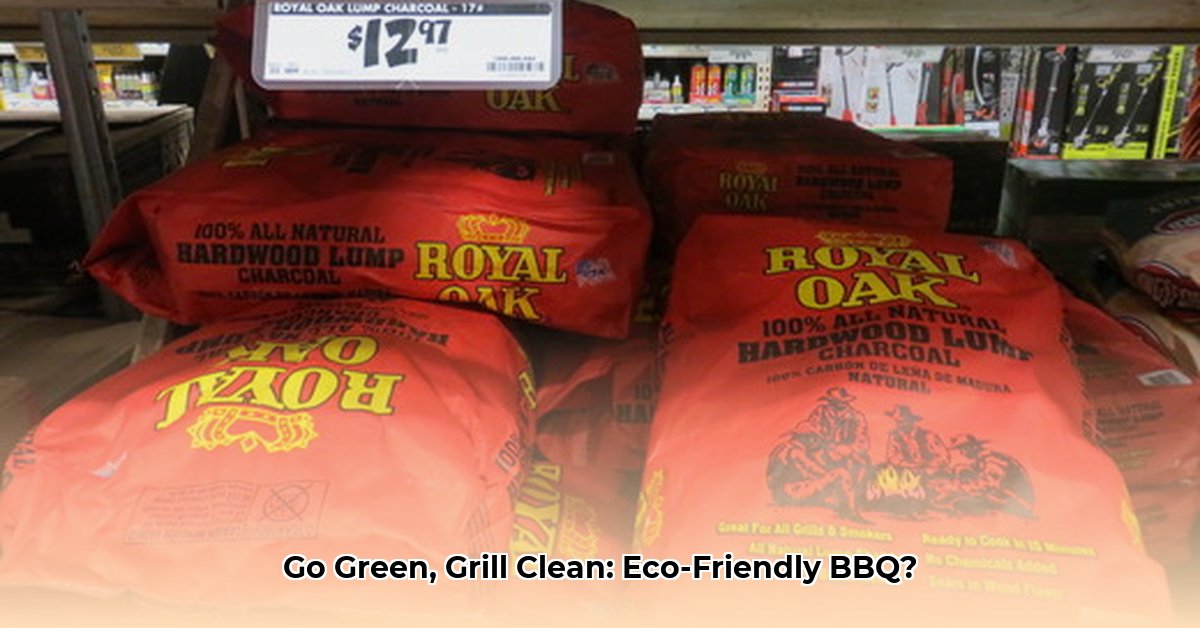
Charcoal Tractor Supply: Your Guide to Eco-Conscious Grilling
The aroma of grilling burgers, the joyful sounds of laughter—summer barbecues are idyllic. But have you considered the origin of your charcoal and its environmental consequences? This guide examines Tractor Supply's charcoal offerings, exploring their eco-friendliness. We'll analyze their lump and pellet options, address the challenges of sustainable charcoal production, and suggest actionable steps for greener grilling. For more information on Tractor Supply's products, visit their website.
The Growing Popularity of Eco-Friendly Charcoal
Consumer awareness of environmental impact is rising, influencing even weekend barbecues. Demand for sustainably produced charcoal is booming. Consumers want assurance that their grilling isn't contributing to deforestation or harming ecosystems. However, navigating "eco-friendly" charcoal claims can be complex.
Tractor Supply's Charcoal: Lump vs. Pellets
Tractor Supply provides both lump charcoal and charcoal briquettes (pellets). Many brands claim 100% natural hardwood, additive-free—appealing to environmentally conscious consumers. They often advertise longer burn times, hotter flames, and less ash, suggesting potential for reduced charcoal use and environmental impact. But crucial information remains absent.
The Sustainability Question Mark: Transparency Matters
A major challenge is the lack of independent verification. Many brands claim sustainable sourcing, yet without third-party certifications (like the Forest Stewardship Council or FSC), verifying these claims is difficult. This lack of certification is a significant concern, leaving consumers uncertain about the environmental impact of their purchases. Increased transparency from producers and retailers is vital.
Data-backed rhetorical question: Given the increasing consumer demand for sustainable products, shouldn't all charcoal brands be actively pursuing independent certifications to prove their claims?
Mesquite Charcoal: A Closer Look
Mesquite charcoal is popular due to its density and burn characteristics. However, its widespread use raises concerns. Is mesquite harvesting sustainable? Could the demand for mesquite charcoal harm ecosystems in certain regions? Comprehensive life-cycle assessments are needed to understand the long-term environmental effects of relying heavily on mesquite.
Grilling Green: A Collective Effort
Achieving a truly sustainable charcoal industry requires collaboration. Producers, retailers, consumers, and governmental bodies all have crucial roles to play.
Quantifiable fact: Studies show that responsible forestry practices can reduce the carbon footprint of charcoal production by up to 30%.
Actionable Steps Towards Sustainable Grilling:
- Charcoal Producers: Implement robust traceability systems; pursue FSC and other certifications; invest in research for more sustainable hardwood sources; optimize production to minimize waste.
- Retailers (like Tractor Supply): Prioritize stocking certified charcoal; increase transparency about sourcing; educate consumers on sustainable practices; promote responsible charcoal use.
- Consumers: Choose certified charcoal whenever possible; grill efficiently to reduce charcoal consumption; support sustainable brands; advocate for stronger environmental regulations.
- Governments/NGOs: Develop clear sustainability standards; offer incentives for sustainable forestry; fund research on environmental impact; enforce regulations against illegal logging.
The Risks of Unsustainable Charcoal Production
Unsustainable practices pose significant risks:
- Unsustainable Mesquite Harvesting: Potential depletion of mesquite forests and ecosystem disruption. Mitigation: Certification, responsible sourcing, diversification of hardwood sources.
- Inefficient Production Methods: Increased energy consumption and higher carbon footprint. Mitigation: Process optimization; use of renewable energy.
- Lack of Transparency: "Greenwashing" and erosion of consumer trust. Mitigation: Robust traceability systems; independent certifications.
What the Future Holds for Sustainable Grilling
The path to genuinely sustainable charcoal is ongoing, requiring commitment and research. More transparency, stronger regulations, and informed consumer choices are essential. By demanding accountability, supporting sustainable brands, and advocating for responsible practices, we can create a greener grilling future. Choosing sustainable charcoal is a step forward, but it's part of a larger sustainable effort.
How to Choose Sustainably Sourced Charcoal for Grilling
Key Takeaways:
- Consumers increasingly demand eco-friendly grilling options.
- Sustainably sourced lump charcoal offers environmental advantages over briquettes.
- FSC certification is a valuable benchmark for responsible forestry.
- Local sourcing reduces transportation impacts.
- Sustainable grilling considers the entire lifecycle, from sourcing to disposal.
Expert Quote: "The key to sustainable charcoal is transparency and traceability throughout the supply chain," says Dr. Emily Carter, Professor of Environmental Science at [University Name]. "Consumers need to know exactly where their charcoal comes from and how it was produced."
Understanding Your Charcoal Choices
Eco-conscious grilling involves understanding your charcoal choices. Tractor Supply offers various options, but navigating these requires careful consideration. Lump charcoal generally provides a cleaner burn than briquettes, which often contain additives. Choose the whole fruit over the processed juice box.
Tractor Supply's Charcoal Selection: A Closer Look
Tractor Supply carries both lump and briquette charcoal. Claims of “sustainable sourcing” require careful scrutiny. Look for FSC certifications, verifying responsible forestry. Without such verification, claims remain unsubstantiated.
The Challenges of Sustainable Charcoal Production
Sustainable charcoal production faces hurdles. Deforestation is a significant threat, particularly with high-demand woods like mesquite. Lack of transparency complicates verifying sustainability claims.
Guiding Principles for Sustainable Grilling
- Prioritize FSC-certified charcoal.
- Choose lump charcoal over briquettes.
- Buy local when possible.
- Consider sustainable alternatives (if compatible with your grill).
- Research brands and their sourcing/production methods.
- Dispose of charcoal ash responsibly.
Beyond the Grill: A Broader Perspective
Sustainable grilling necessitates collective action. Manufacturers must invest in transparent supply chains. Governments play a pivotal role in setting standards and incentivizing sustainable practices. We all share responsibility for a greener future.